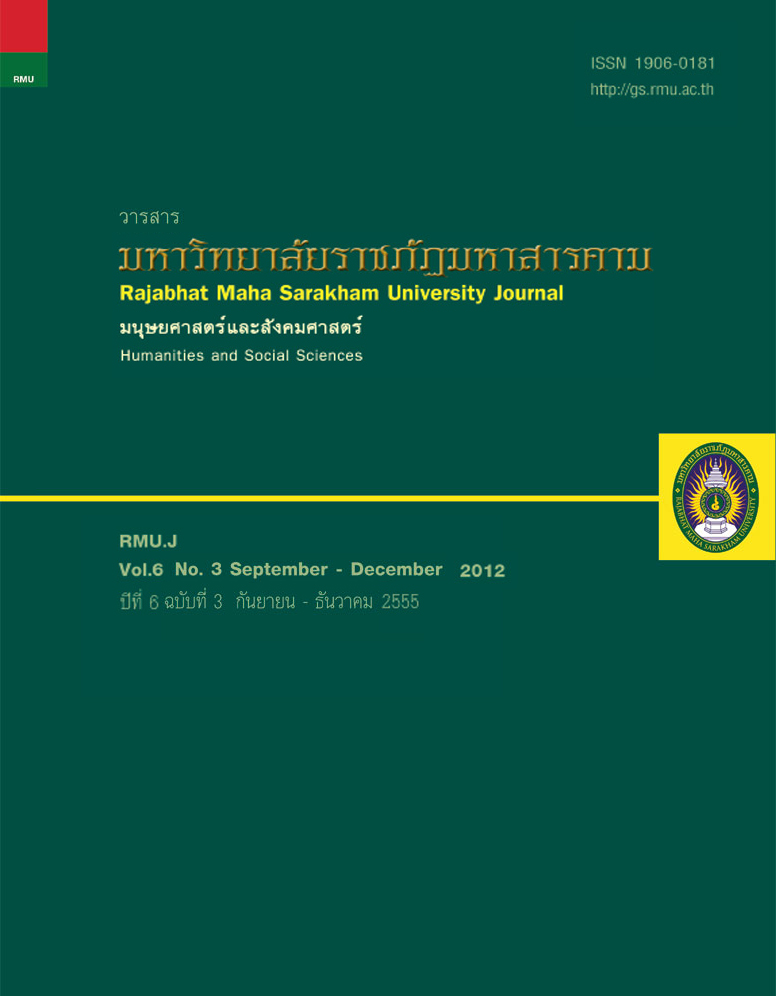กลยุทธ์การจัดการการท่องเที่ยวแบบโฮมสเตย์ที่ยั่งยืนในภาคตะวันออกเฉียงเหนือ
Main Article Content
บทคัดย่อ
บทคัดย่อ
การวิจัยเรื่องกลยุทธ์การจัดการท่องเที่ยวแบบโฮมสเตย์ที่ยั่งยืนในภาคตะวันออกเฉียงเหนือมีวัตถุประสงค์เพื่อศึกษา พัฒนาการของนโยบายการจัดการการท่องเที่ยว การจัดการการท่องเที่ยวแบบโฮมสเตย์ และพัฒนากลยุทธ์การจัดการท่องเที่ยว แบบโฮมสเตย์ที่ยั่งยืนในภาคตะวันออกเฉียงเหนือ วิธีการวิจัยเป็นการวิจัยเชิงคุณภาพ (Qualitative research) โดยใช้กรณี ศึกษา ที่เป็น Best practices 3 แห่ง คือ 1) บ้านปราสาท 2) บ้านบุไทร จ.นครราชสีมา และ 3) บ้านโคกโก่ง จ.กาฬสินธุ์ การ รวบรวมข้อมูลด้วยแบบสัมภาษณ์กึ่งโครงสร้าง การสัมภาษณ์เชิงลึกประชากรและกลุ่มตัวอย่างประกอบด้วย 1)สมาชิกกลุ่มโฮมสเตย์ 2) องค์กรด้านการท่องเที่ยว 3) นักท่องเที่ยว และ 4) ประชาชนในชุมชนโฮมสเตย์ การวิเคราะห์ข้อมูลเชิงเนื้อหา การวิเคราะห์สภาพ แวดล้อม (SWOT analysis) การตรวจสอบข้อมูลแบบสามเส้า (Triangulation) ผลการวิจัย พบว่า
1. นโยบายการจัดการท่องเที่ยวแบบโฮมสเตย์ในประเทศไทย เดิมเป็นส่วนหนึ่งของการจัดการท่องเที่ยวเชิงอนุรักษ์ในพื้นที่ การท่องเที่ยวที่ไม่มีโรงแรมนักท่องเที่ยวต้องขอพักกับชาวบ้าน จนกระทั่งปี พ.ศ. 2546 กระทรวงการท่องเที่ยวและกีฬาได้ประกาศ นโยบายให้ชัดเจน มีการดำเนินแผนงานต่าง ๆ เพื่อส่งเสริมการท่องเที่ยวแบบโฮมสเตย์อย่างชัดเจน การสร้างดัชนีชี้วัดมาตรฐาน คุณภาพ การจัดทำฐานข้อมูลโฮมสเตย์ในประเทศไทย การออกพระราชบัญญัติเกี่ยวกับการท่องเที่ยวแบบโฮมสเตย์ การจัดทำตรา สัญลักษณ์มาตรฐานโฮมสเตย์การติดตามประเมินผลเพื่อรับรองโฮมสเตย์มาตรฐานไทยการหนุนเสริมศักยภาพบุคลากรในการจัดการ ท่องเที่ยวแบบโฮมสเตย์ นโยบายการสร้างความร่วมมือกับธนาคารเกษตรและสหกรณ์เพื่อนำตราสัญลักษณ์ของโฮมสเตย์มาตรฐาน ไทยมาแปลงทรัพย์สินเป็นทุน
2. การจัดการท่องเที่ยวแบบโฮมสเตย์ในภาคตะวันออกเฉียงเหนือ ในยุคแรกเป็นรูปแบบนักศึกษาเดินทางมาออกค่ายอาสา พัฒนาชนบทที่ต้องการเรียนรู้วิถีชีวิตในชนบท ยุคกลางเป็นกลุ่มองค์กรพัฒนาเอกชน มีการแลกเปลี่ยนเรียนรู้ระหว่างกลุ่ม การเดิน ทางเพื่อศึกษาดูงาน และยุคใหม่ การจัดการท่องเที่ยวแบบโฮมสเตย์ โดยรัฐบาลมีนโยบายสนับสนุน ระหว่างปี 2547-2552 มีโฮม สเตย์ที่ขึ้นทะเบียนกับกระทรวงการท่องเที่ยวและกีฬาจำนวน 115 แห่ง โดยอยู่ในพื้นที่ของภาคตะวันออกเฉียงเหนือจำนวน 32 แห่ง โดยมีแนวทางการจัดการตามตัวชี้วัดคุณภาพมาตรฐานโฮมสเตย์ไทย 10 ด้าน คือ 1) ด้านที่พัก 2) ด้านอาหารและโภชนาการ 3) ด้าน ความปลอดภัย 4) ด้านอัธยาศัย-ไมตรีของเจ้าบ้านและสมาชิก 5) ด้านกิจกรรมการท่องเที่ยว 6) ด้านทรัพยากรธรรมชาติและสภาพ แวดล้อม 7) ด้านวัฒนธรรม 8) ด้านการสร้างคุณค่าและมูลค่าเพิ่มของผลิตภัณฑ์ชุมชน 9) ด้านการบริหารกลุ่มโฮมสเตย์ และ 10) ด้านส่งเสริมการตลาดและประชาสัมพันธ์
3. กลยุทธ์การจัดการท่องเที่ยวแบบโฮมสเตย์ที่ยั่งยืนในภาคตะวันออกเฉียงเหนือ ประกอบด้วย 1) กลยุทธ์ทุนเดิมในชุมชน หรือ ทรัพยากรการท่องเที่ยว 2) กลยุทธ์การมีส่วนร่วม 3) กลยุทธ์ด้านโครงสร้างพื้นฐาน 4) กลยุทธ์การให้การศึกษาและการพัฒนา บุคลากร 5) กลยุทธ์ภาวะผู้นำ 6) กลยุทธ์การตลาด การบริการ การโฆษณาและการประชาสัมพันธ์ 7) กลยุทธ์การสร้างเครือข่าย และ 8) กลยุทธ์การสร้างมาตรฐานการท่องเที่ยว
ข้อเสนอแนะ กลยุทธ์การจัดการท่องเที่ยวแบบโฮมสเตย์ที่ยั่งยืนนั้นจะประสบความสำเร็จได้ต้องเกิดจากความต้องการและ ทรัพยากรของชุมชุน การขับเคลื่อนภายใต้เงื่อนไขของการจัดการท่องเที่ยวที่ยั่งยืน โดยมีเป้าหมายทั้งด้านเศรษฐกิจและสังคม กล่าว คือเป็นเครื่องมือในการสร้างรายได้เสริม การสร้างความสามัคคี สร้างความผูกพันในท้องถิ่น สร้างความตระหนักในการอนุรักษ์ ทรัพยากรธรรมชาติ สิ่งแวดล้อม ศิลปวัฒนธรรม วิถีชีวิต ประเพณี การที่จะประสบความสำเร็จได้นั้นสิ่งที่ต้องตระหนักเสมอก็คือ การพัฒนาบุคลากรในชุมชนให้มี ความรู้ ความเข้าใจ และจิตสำนึกในการจัดการท่องเที่ยวที่ถูกต้อง และเหมาะสมกับบริบทของชุมชน
คำสำคัญ : กลยุทธ์การจัดการท่องเที่ยว, โฮมสเตย์, ภาคตะวันออกเฉียงเหนือ
ABSTRACT
The study of strategies for sustainable home stay tourism management in the northeastern region aimed at studying the development of tourism management policies, home stay tourism management and develop strategies for sustainable home stay tourism management in the northeast of Thailand. The qualitative research was conducted in three best practice sites: Ban Prasart, Ban Bu Sai in Nakhonratchsrima Province and Ban Khok Kong in Kalasin Province. The samples were home stay members, travel agencies, tourists, and people in home stay tourism communities. The data were collected by semi-structured interview and dept interview, SWOT and environmental analysis was used for data analysis, and the data of triangulation were also examined. The research findings were as follows:
1. The former policy of home stay tourism management in Thailand was one policy of the ecotourism management in the areas without hotel Thailand. People in community offered the tourists home stay services. In 2003, the Ministry of Tourism and Sports declared officially the policies and various projects on promoting home stay tourism with standard quality indicators, home stay database in Thailand, enactment of Home Stay Tourism Act, home stay logo preparation, evaluation, home stay personnel development, and policy of the cooperation with the Bank for Agriculture and Agricultural Co-Operatives for capitals.
2. In the first period of, home stay tourism management in the Northeast was characterized by camping activities of university students for rural development, and the students had learned about life in rural areas. In middle period the private sectors took an important roles in promoting home stay tourism by sharing experience and study visit. In 2004-2009, the government had the policies of home stay tourism management, and there are currently 115 registered home stay houses throughout Thailand and there are only 32 the registered home stay houses in the Northeast if Thailand. The home stay tourism in Thailand has been managed based on 10 indicators for quality assessment as follows: 1) accommodations 2) food and nutrition 3) security 4) hospitality of the host, 5) activities 6) natural resources and environment 7) culture 8) additional values of community products 9) home stay management 10) marketing promotion and public relations.
3. Strategies for sustainable home stay tourism management in the northeastern region consisted of 1) original capital in the community or tourism resources 2) participatory strategy, 3) infrastructural strategy 4) human resource development 5) leadership strategy 6) marketing strategy, services, advertising and public relations, 7) network system strategy and 8) tourism standard strategy. In conclusion, the successful strategies for sustainable home stay tourism management in the north eastern region should be based on the needs of people and resources in the community. The sustainable tourism should be managed to achieve both the economic and social purposes. It is obvious that the sustainable home stay tourism management will provide extra income, communities’ unity, awareness of environmental conservation, culture and traditions. Therefore, the knowledge, professional skills and awareness of human resource the community should be developed regularly for the effective and efficient tourism management in the commaunity.
Keyword : Strategies for Tourism Management, Home Stay, North Eastern Region
Article Details
1. บทความที่ลงตีพิมพ์ทุกเรื่องได้รับการตรวจทางวิชาการโดยผู้ประเมินอิสระ ผู้ทรงคุณวุฒิ (Peer Review) สาขาที่เกี่ยวข้อง อย่างน้อย 3 ท่าน ในรูปแบบ Double blind review
2. ข้อคิดเห็นใด ๆ ของบทความที่ลงตีพิมพ์ในวารสารมหาวิทยาลัยราชภัฏมหาสารคาม นี้เป็นของผู้เขียน คณะผู้จัดทำวารสารไม่จำเป็นต้องเห็นด้วย
3. กองบรรณาธิการวารสารมหาวิทยาลัยราชภัฏมหาสารคาม ไม่สงวนสิทธิ์การคัดลอกแต่ให้อ้างอิงแสดงที่มา


